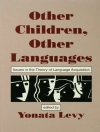This book offers a unique understanding of how researchers’ linguistic resources, and the languages they use in the research process, are often politically and structurally shaped and constrained, with implications for the reliability of the research. The chapters are written by both experienced and novice researchers, who examine how they negotiated the use of their own, and others’, linguistic and communicative resources when undertaking their research in politically-charged, and linguistically and culturally diverse contexts. The contributing authors are either from the Global South, or engaged in work which is contextualised within the Global South; or they face linguistic structural hegemonies in the Global North which challenge their research processes. They utilise diverse theoretical, methodological and disciplinary approaches to produce a collection of engaging and accessible accounts of researching multilingually in their contexts. These accounts will help readers to make theoretically and methodologically informed choices about the political dimensions of languages in their own research when researching multilingually.
Spis treści
Acknowledgements
Contributors
Alison Phipps: Foreword: Towards a Reparatory Politics of Researching Multilingually
Prue Holmes, Judith Reynolds and Sara Ganassin: Introduction: The Imperative for the Politics of ‘Researching Multilingually’
Part 1: Hegemonic Structures
Chapter 1. Wine Tesseur: Linguistic Hospitality and Listening through Interpreters: Critical Reflections and Recommendations on Linguistic Power Relationships in Multilingual Research
Chapter 2. Shameem Oozeerally: Multilingualism, Shifting Paradigms and the 21st Century: Negotiating Multilingual Research in Teams through the Lens of Complexity
Chapter 3. Lamia Nemouchi and Prue Holmes: Multilingual Researching, Translanguaging and Credibility in Qualitative Research: A Reflexive Account
Chapter 4. Adam Wilson: Publish or perish, publier ou périr? How Research Publication Language Choice is Shaped Among Linguistics Early Career Researchers in France
Part 2: Power Relations
Chapter 5. Alexandra Georgiou: Conducting Multilingual Classroom Research with Refugee Children in Cyprus: Critically Reflecting on Methodological Decisions
Chapter 6. Helina Hookoomsing: Voice and Power Relations: Researching Multilingually with Multilingual Children in Mauritian Pre-primary Schools
Chapter 7. Olga Camila Hernández Morales and Anne-Marie de Mejía: Challenges for Researchers Investigating Coloniality Multilingually in Complex Linguistic Contexts in the Caribbean
Chapter 8. Jessica Chandras: Speaking Marathi Like a Punekar: Learning Class and Caste in India
Part 3. Decolonizing Methodologies
Chapter 9. Julie S. Byrd Clark and Sylvie Roy: Multilingual Research for New Social Realities: Towards a Transdisciplinary Approach
Chapter 10. Erika Kalocsányiová and Malika Shatnawi: Transcribing (Multilingual) Voices: From Fieldwork to Publication
Chapter 11. Bridget Backhaus: Interpreting Cognitive Justice: A Framework for Interpreters as Co-researchers in Postcolonial Multilingual Research
Chapter 12. Michael Richardson: Bilingual Theatre in British Sign Language and English: A Reflection on the Challenges Faced During a Doctoral Applied Theatre Project
Part 4: Decolonizing Languages
Chapter 13. Rebekah R. Gordon: Translanguaging Pedagogy as Methodology: Leveraging the Linguistic and Cultural Repertoires of Researchers and Participants to Mutually Construct Meaning and Build Rapport
Chapter 14. Rosa Alejandra Medina Riveros and Theresa Austin: Decolonizing Research through Translanguaging: Negotiating Practices with Multilingual Teachers in Colombia
Chapter 15. Liliane Meyer Pitton and Larissa Semiramis Schedel: The (Hidden) Politics of Language Choice in Research on Multilingualism: Moments of (Dis)Empowerment
Chapter 16. Christiana Holsapple: Speaking ‘No Language?’: Reflections on (Il)Legitimate Multilingualism from Fieldwork in Gagauzia
Prue Holmes, Judith Reynolds and Sara Ganassin: Afterword
Index
O autorze
Sara Ganassin is Lecturer in applied linguistics and communication in the School of Education, Communication and Language Sciences, Newcastle University, UK. She is the author of Language, Culture and Identity in Two Chinese Community Schools. More than One Way of Being Chinese? (2020, Multilingual Matters).












